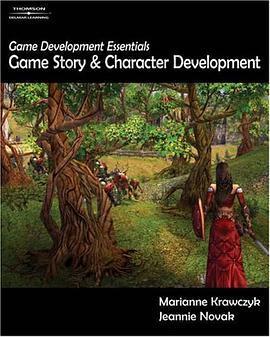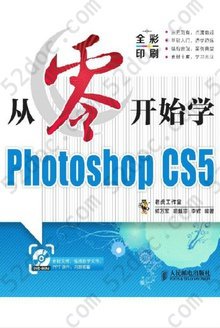注重体验与质量的电子书资源下载网站
分类于: 设计 人工智能
简介

Game Development Essentials 豆 0.0分
资源最后更新于 2020-09-23 15:11:29
作者:Marianne Krawczyk
出版社:Cengage Learning
出版日期:2006-01
ISBN:9781401878856
文件格式: pdf
标签: 游戏设计 游戏开发 game 游戏研发 设计 英文版 游戏行业 大学后
简介· · · · · ·
Game Story & Character Development-the newest installment in Cengage Learning's acclaimed Game Development Essentials series-shows how to create compelling stories and characters specifically for games. The book examines the history of storytelling, traditional and game-specific story structure, and all aspects of character development, including physical, psychological, sociol...
目录
Introduction xiii
About the Game Development Essentials Series xiv
About Game Story & Character Development xiv
Who Should Read This Book? xv
How is This Book Organized? xv
How to Use This Text xvi
key chapter questions xvi
tips xvi
sidebars xvi
quotes xvii
profiles xvii
case studies xvii
notes xvii
chapter review xviii
About the Companion CD xviii
About the Instructor¿s Guide xviii
About the Authors xix
Acknowledgements xx
Questions & Feedback xxii
Dedication xxiii
Part I: Story 1
Chapter 1The History of Story:how we¿ve evolved as storytellers 3
Key Chapter Questions 3
Cave Paintings 4
Oral Traditions 5
Fable 7
Myth 7
Legend 7
Urban Legend 8
Ah, the Theater! 9
The World of Text 11
Film: Back into the Cave 12
Television 14
Chapter Review 17
Chapter 2Game Genres:storytelling through style of play 19
Key Chapter Questions 19
Action 20
Platformers 21
Shooters 22
Racing 24
Fighting 25
Adventure 26
Action-Adventure 27
Puzzle 31
Role-Playing 32
Simulation & Sports 36
Turn-Based Strategy (TBS) 37
Strategy 38
Real-Time Strategy (RTS) 39
Chapter Review 41
Chapter 3Building Your Story:how to construct a story from concept to execution 43
Key Chapter Questions 43
Concept 44
Springboard 45
Setting 46
Context 47
Backstory 50
Premise 53
Synopsis or Treatment 54
Theme 57
Traditional Structures 58
Three-Act Story Structure 58
The Hero¿s Journey 60
Episodic 63
Devices for Execution 66
Inciting Incident 66
Foreshadowing 67
Conflict 68
Unity of Opposites 69
Goals 70
MacGuffin 71
Ticking Clock 71
Story versus Plot 72
Plot Points 73
Plot Twists 75
Climax 79
Deus Ex Machina 79
Chapter Review 81
Chapter 4Game Storytelling Devices:integrating game-specific elements into a story 83
Key Chapter Questions 83
Conveying Information 84
Cinematics 85
Cut-Scenes 86
Triggered Events 87
Player Control 89
Character Customization 90
Plot 91
Consequences 92
Engagement and Interactivity 92
Collaboration 92
Immersion 93
Repetition 93
Consistency 94
Flow 94
Non-Linearity 94
Emotional Content 96
Experiential Storytelling 96
Creating the Emotional Experience 101
Chapter Review 104
Part II: Character 105
Chapter 5Character Types:who are your characters? 107
Key Chapter Questions 107
Archetypes 108
Hero 108
Shadow 109
Mentor 109
Helpers 110
Guardian 110
Trickster 111
Herald 111
Contemporary Character Types 112
Protagonist 112
Antihero 113
Co-Protagonists 114
Antagonist 115
Ancillary Characters 116
Pivotal Character 117
Sidekicks 117
Lackey 118
Allies 118
Henchmen 119
Mole 119
Game-Specific Characters 119
Player Characters (PCs) 120
Avatar 120
Non-Player Characters (NPCs) 121
Chapter Review 125
Chapter 6Character Development:building compelling characters 127
Key Chapter Questions 127
Creating a Character Backstory 128
Character Physiology 128
Character Sociology 130
Character Psychology 132
Discovering Character 134
Internal Conflict 134
Finding the Conflict: Free Writing 135
Turning Up the Heat 136
Compassion 138
Ancillary Characters 139
Consistency 139
Character Growth 140
Character Arc 140
Relationships 144
Dyad 144
Triangle 144
Point of View 145
First-Person 145
Third-Person 146
Visual Character Development 147
Back to the Drawing Board 147
Character Movement 149
Style 149
Chapter Review 151
Chapter 7Verbal Character Development:effective use of narration, monologue & dialogue 153
Key Chapter Questions 153
Narration 154
First-Person 154
Third-Person 155
Monologue 156
Dialogue 157
Purposes of Dialogue 159
Non-Verbal Dialogue 168
In-Game Dialogue 168
Writing Great Dialogue 172
Chapter Review 177
Part III: Gameplay 179
Chapter 8Gameplay and Story:incorporating challenges and strategies into a game story 181
Key Chapter Questions 181
Conflict in Gameplay 182
Balance 185
Game Balance 187
Dynamic Balance 191
Building Tension 192
Rules 196
Gameplay Elements 197
Game Theory 203
Zero Sum vs. Non-Zero Sum 203
Prisoner¿s Dilemma 204
Tragedy of the Commons 205
Level Structure 207
Space 207
Flow 208
Time 209
Choice 210
Goal 211
Relationship 211
Progression 213
Chapter Review 215
Chapter 9Putting Your Plan into Action:implementing a successful storyplay 217
Key Chapter Questions 217
Your Game Plan 218
What is the Theme? 218
What is Your Story? 218
What is Your Genre? 219
What is Your Environment? 219
What is Your Setting? 219
What Character Types Do You Need? 220
How to Tell It 221
Goals 221
Game Documentation 222
Hamlet: Prince of Denmark 223
Caesar¿s Quest 230
Movies and Games 236
Where Does the Writer Fit in? 239
Chapter Review 243
Resources 244
News 244
Directories & Communities 245
Organizations 245
Events 246
Books & Articles 246
Index 252
About the Game Development Essentials Series xiv
About Game Story & Character Development xiv
Who Should Read This Book? xv
How is This Book Organized? xv
How to Use This Text xvi
key chapter questions xvi
tips xvi
sidebars xvi
quotes xvii
profiles xvii
case studies xvii
notes xvii
chapter review xviii
About the Companion CD xviii
About the Instructor¿s Guide xviii
About the Authors xix
Acknowledgements xx
Questions & Feedback xxii
Dedication xxiii
Part I: Story 1
Chapter 1The History of Story:how we¿ve evolved as storytellers 3
Key Chapter Questions 3
Cave Paintings 4
Oral Traditions 5
Fable 7
Myth 7
Legend 7
Urban Legend 8
Ah, the Theater! 9
The World of Text 11
Film: Back into the Cave 12
Television 14
Chapter Review 17
Chapter 2Game Genres:storytelling through style of play 19
Key Chapter Questions 19
Action 20
Platformers 21
Shooters 22
Racing 24
Fighting 25
Adventure 26
Action-Adventure 27
Puzzle 31
Role-Playing 32
Simulation & Sports 36
Turn-Based Strategy (TBS) 37
Strategy 38
Real-Time Strategy (RTS) 39
Chapter Review 41
Chapter 3Building Your Story:how to construct a story from concept to execution 43
Key Chapter Questions 43
Concept 44
Springboard 45
Setting 46
Context 47
Backstory 50
Premise 53
Synopsis or Treatment 54
Theme 57
Traditional Structures 58
Three-Act Story Structure 58
The Hero¿s Journey 60
Episodic 63
Devices for Execution 66
Inciting Incident 66
Foreshadowing 67
Conflict 68
Unity of Opposites 69
Goals 70
MacGuffin 71
Ticking Clock 71
Story versus Plot 72
Plot Points 73
Plot Twists 75
Climax 79
Deus Ex Machina 79
Chapter Review 81
Chapter 4Game Storytelling Devices:integrating game-specific elements into a story 83
Key Chapter Questions 83
Conveying Information 84
Cinematics 85
Cut-Scenes 86
Triggered Events 87
Player Control 89
Character Customization 90
Plot 91
Consequences 92
Engagement and Interactivity 92
Collaboration 92
Immersion 93
Repetition 93
Consistency 94
Flow 94
Non-Linearity 94
Emotional Content 96
Experiential Storytelling 96
Creating the Emotional Experience 101
Chapter Review 104
Part II: Character 105
Chapter 5Character Types:who are your characters? 107
Key Chapter Questions 107
Archetypes 108
Hero 108
Shadow 109
Mentor 109
Helpers 110
Guardian 110
Trickster 111
Herald 111
Contemporary Character Types 112
Protagonist 112
Antihero 113
Co-Protagonists 114
Antagonist 115
Ancillary Characters 116
Pivotal Character 117
Sidekicks 117
Lackey 118
Allies 118
Henchmen 119
Mole 119
Game-Specific Characters 119
Player Characters (PCs) 120
Avatar 120
Non-Player Characters (NPCs) 121
Chapter Review 125
Chapter 6Character Development:building compelling characters 127
Key Chapter Questions 127
Creating a Character Backstory 128
Character Physiology 128
Character Sociology 130
Character Psychology 132
Discovering Character 134
Internal Conflict 134
Finding the Conflict: Free Writing 135
Turning Up the Heat 136
Compassion 138
Ancillary Characters 139
Consistency 139
Character Growth 140
Character Arc 140
Relationships 144
Dyad 144
Triangle 144
Point of View 145
First-Person 145
Third-Person 146
Visual Character Development 147
Back to the Drawing Board 147
Character Movement 149
Style 149
Chapter Review 151
Chapter 7Verbal Character Development:effective use of narration, monologue & dialogue 153
Key Chapter Questions 153
Narration 154
First-Person 154
Third-Person 155
Monologue 156
Dialogue 157
Purposes of Dialogue 159
Non-Verbal Dialogue 168
In-Game Dialogue 168
Writing Great Dialogue 172
Chapter Review 177
Part III: Gameplay 179
Chapter 8Gameplay and Story:incorporating challenges and strategies into a game story 181
Key Chapter Questions 181
Conflict in Gameplay 182
Balance 185
Game Balance 187
Dynamic Balance 191
Building Tension 192
Rules 196
Gameplay Elements 197
Game Theory 203
Zero Sum vs. Non-Zero Sum 203
Prisoner¿s Dilemma 204
Tragedy of the Commons 205
Level Structure 207
Space 207
Flow 208
Time 209
Choice 210
Goal 211
Relationship 211
Progression 213
Chapter Review 215
Chapter 9Putting Your Plan into Action:implementing a successful storyplay 217
Key Chapter Questions 217
Your Game Plan 218
What is the Theme? 218
What is Your Story? 218
What is Your Genre? 219
What is Your Environment? 219
What is Your Setting? 219
What Character Types Do You Need? 220
How to Tell It 221
Goals 221
Game Documentation 222
Hamlet: Prince of Denmark 223
Caesar¿s Quest 230
Movies and Games 236
Where Does the Writer Fit in? 239
Chapter Review 243
Resources 244
News 244
Directories & Communities 245
Organizations 245
Events 246
Books & Articles 246
Index 252








